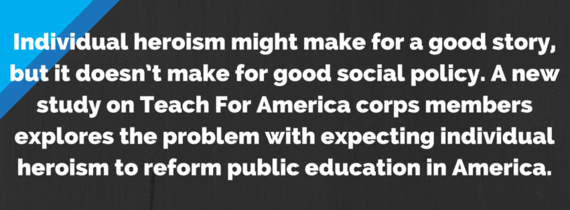Teach For America's mantra, 'Work Hard, Get Smart', offers an enticing theory of education reform--but does it work?
Twenty-six corps members from the 2011 and 2012 TFA Greater Philadelphia corps opted into my study. As this is a relatively small, self-selected sample, this study is not intended to be representative of all TFA corps members, or even all TFA Greater Philadelphia corps members. However, this expository account raises important questions about the frequency, range, and implications of negative experiences in TFA-- particularly those currently ignored or suppressed by TFA.
Many corps members are working hard, yet they commonly self-described their experiences with the words "shame," "failure," and "isolating." While working in racially segregated and under-resourced schools, 35 percent of the corps members in this study began professional counseling; 27 percent began taking prescription medications to address depression, anxiety, and trauma; 38 percent experienced increased alcohol consumption and dependency; 42 percent experienced major weight changes; 46 percent experienced strained relationships; and 73 percent experienced physical fatigue, some to the point of requiring medical attention.
These corps members' experiences invite critical reflection on educational reform policies and practices in America today.
What are we saying when we endorse the slogan, 'Work Hard, Get Smart'?
The TFA slogan 'Work Hard, Get Smart' is not only an encouragement to work hard--it is also an interpretation of how the world works. This message was explicitly taught in TFA trainings and CMs then often communicated this slogan to their students.
'Work Hard, Get Smart' is a simplification of the theory of malleable intelligence. Every person has the capacity to grow, and CMs' and students' actions can have significant impact. However, in the pursuit of creating a catchy slogan, 'Work Hard, Get Smart' implies that CMs' and students' outcomes are a result of their efforts alone, and overlooks other important factors such as institutional racism.
What is best for students?
Working harder is not a solution to these CMs' struggles. And it is difficult for CMs to extend the best instructive care possible to students when many struggled to care for themselves on a fundamental level. Teachers' mental health affects the classroom learning environment and students' academic growth--the more depressive symptoms teachers have, the less progress in math their struggling students make during the school year. For teachers to do their best work, they themselves must be well.
The narrative of 'Work Hard, Get Smart' and 'No Excuses' demands individual hero sacrifice. This kind of oversimplified idealism encouraged dehumanizing behaviors among many CMs and negatively impacted their well-being as people and as teachers.
Emerging patterns of alcohol dependency and needs for prescription medication among TFA CMs are not invitations to collectively try harder or press further into the narrative that exacts these costs. It calls for a re-examination of the narrative.
As a society, we must ask ourselves: what structural changes are required so that we don't demand the sacrifice of individual "hero teachers" in the name of educational equity and justice?
Individual heroism might make for a good story, but it doesn't make for good social policy.
Educational inequity has a legacy in the U.S.: students were historically advantaged or disadvantaged based on socially constructed systems of race, class, and gender. Some of these inequities have lessened in severity, but these systems still exist.
The U.S. is not a perfect meritocracy, and individual effort is only one of many factors that impacts a person's social, economic, and political life. According to a 2010 Pew study, Americans raised at the top and bottom of the family income ladder are likely to stay there as adults. This problematic reality is reflected in our education systems: in the nation's top 193 most selective colleges, only 14% of students came from the bottom half of Americans in terms of socioeconomic status; only 5% of students came from the lowest quartile.
Slogans such as 'Work Hard, Get Smart', which focus primarily on the psychology of individuals, paint an inaccurate picture when presented in isolation or as a comprehensive solution to educational inequity. If we are to learn from psychology, we must also learn from sociology--we need to shift our focus away from individually-based solutions of working harder, because when it comes to educational inequity in America, lack of hard work was never the problem to begin with.
Focusing primarily on the decontextualized efforts of individual poor students of color and their individual educators precludes a need for systemic change. The current TFA approach promotes short-term, individually-focused solutions without addressing the social construction of educational inequity. This discourse places all responsibility on individual poor students of color and their individual educators to simply try harder and care more--as opposed to a discourse that also holds the larger society accountable for its historic and present marginalization of people by race and class, to the education debt the American public has accumulated and owes to entire groups of people and their subsequent generations.
TFA's stated mission is to "lead an educational revolution in low-income communities across the country." If we as educators, education reformers, and the general public accept TFA founder Wendy Kopp's message that there is "nothing elusive" about this work and people just need to "work hard" and be "disciplined", then the solutions should all be the same: it becomes easy to hold fast to the meritocracy myth, to naively ignore historic oppression and social reproduction, to scapegoat structural educational inequity on lazy or uncaring teachers or incompetent students, to claim to be color-blind while holding racialized assumptions about those viewed as other, to perpetuate reductionist narratives to the society outside of teaching, to perpetuate systems of oppression.
Calls demanding individual poor students of color and teachers to be extraordinarily super-human are not addressing systemic inequity. This is not racial or class justice. This is not justice.
